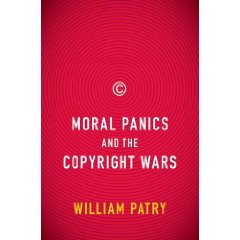It is good that authors should be remunerated; and the least exceptionable way of remunerating them is by a monopoly. Yet monopoly is an evil. For the sake of the good we must submit to the evil; but the evil ought not to last a day longer than is necessary for the purpose of securing the good.
~ Thomas Babington Macaulay in a speech delivered in the House of Commons
 In Moral Panics and the Copyright Wars, William Patry describes the Copyright Wars as a campaign by copyright owners to create a sense of siege, of urgency, of a clear and present danger that must be eliminated by either Congress or the courts:
In Moral Panics and the Copyright Wars, William Patry describes the Copyright Wars as a campaign by copyright owners to create a sense of siege, of urgency, of a clear and present danger that must be eliminated by either Congress or the courts:
The Copyright Wars should be seen as a classic and classically wrong response to innovation. It is innovation, not the status quo. that keeps the economy fresh. … The Copyright Wars are an effort to accomplish the impossible: to stop time, to stop innovation, to stop new ways of learning and new ways of creating. The Copyright Wars are wars to ensure that old business models are frozen into place, and innovative approaches are frozen out.
While Patry has been a copyright lawyer for 27 years as a professor, practitioner and government attorney, it’s hard to forget that he’s Google’s senior copyright counsel. And, if you don’t know, Google is currently at odds with the copyright holders of the planet in a four-year-old copyright lawsuit over Google’s ambitious book-scanning project.
The book scanning case involves Google’s plans to scan millions of books and make them searchable and available for purchase online. A proposed $125 million settlement would give Google digital rights to those works. But the government told a federal judge that the agreement threatens to give Google the power to increase book prices and discourage competition.
That aside, Patry sees copyright as a social relationship. He argues that copyright holders have avoided regulation by describing their rights as “intellectual property” to take it outside any need for any empirical, social justification. But, Patry sees it as a social situation which involves burdens, not just benefits.
When we regard copyright as a system for furthering social relationships, the inquiry shifts away from whether we should regulate — because the entire enterprise is regulatory — and toward what kind of relationships we want to create. The answer is clear, based on constitutional text: We want to (and constitutionally can only) create relationships that further learning.
Patry sees an industry that creates moral panics — a false public perception created by emotional threats in order to increase support for risky behaviors — in a tug-of-war that has persisted from the development of Edison’s kinestoscope to the Sony Betamax recorder to the Redbox DVD rental kiosks.
It has been argued that copyright laws have gone too far in trying to protect the rights of authors and are now a dangerous, blunt instrument more abused against innocents than Tasers. The RIAA goes after P2P file-sharing users. Copryright owners fight infringers across the globe.
Yet, there are plenty of reports of companies misusing the Digital Millennium Copyright Act (DMCA) perhaps for anti-competitive reasons. One USC/Berkeley report suggests that over 30% of DMCA takedown notices may have been improper and potentially illegal. In most of those cases, the notices demanded information be taken offline when it had a perfectly legitimate argument for remaining online.
Patry concludes with a call for remaking our copyright laws so that they are more in balance as they were intended.
About the Author
William Patry is Senior Copyright Counsel at Google Inc. He previously served as copyright counsel to the U.S. House of Representatives, Committee on the Judiciary, a Policy Planning Advisor to the Register of Copyrights, a law professor, and in the private practice of law. He is the most prolific scholar of copyright in history, including being the author of an eight-volume treatise and a separate treatise on the fair use doctrine.
“Moral Panics and the Copyright Wars, ” by William Patry” (292 pages; Oxford University Press, USA) is available through Amazon.


